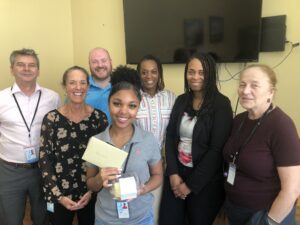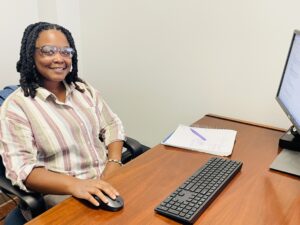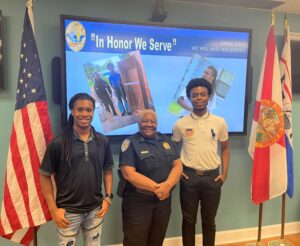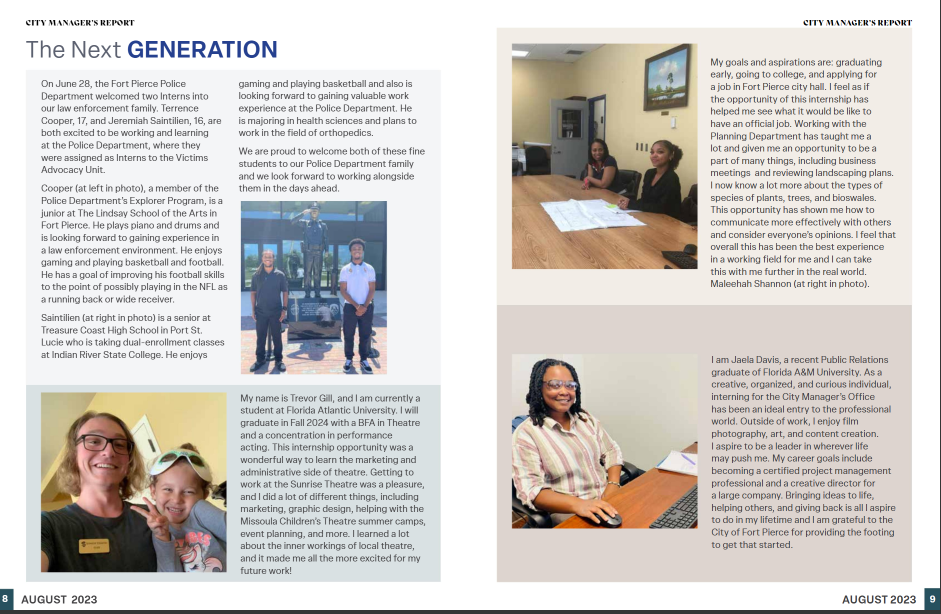 By Marsha Commond, MPA, Redevelopment Specialist, City of Fort Pierce & Fort Pierce Redevelopment Agency
By Marsha Commond, MPA, Redevelopment Specialist, City of Fort Pierce & Fort Pierce Redevelopment Agency
100 N. U.S. Highway 1, Fort Pierce, FL 34950
[email protected]
Making a pivotal shift toward how we prepare the next generation of city and county managers means that internships must be more than helping students gain work skills and hoping they work in our organizations someday. Rather, we should provide a wrap-around experience that leaves them feeling like they belong and are more prepared to take on the world.
We know that the newest generation will make up the workforce of tomorrow. So, if you thought that the millennials were hard to “get”, imagine Gen Z the “digital natives”. Yes, they are the first generation to be born when the internet achieved widespread use. They are highly active on social media and digital platforms and will shape the future of technology.
With that said, if there is anything we need to begin doing today, it’s reaching Gen Z as early as possible, particularly before they reach college age. So many opportunities are marketed to them online before we can be some of the first to appeal to them.
However, Generation Z is seeking careers that are meaningful and flexible to work in. They value happiness over a paycheck and are more entrepreneurial than previous generations.
What the City of Fort Pierce did this past summer to begin making its impressions upon this group was organize an internship experience that added a bit of pizzazz to the ordinary template often used. Interns not only obtai ned valuable work experience in departments of their choice, but they also attended weekly interactive group sessions on topics covering behavioral self-assessments, social and emotional intelligence, networking, interview skills and other pre-employment preparation, the city’s history, local leadership, and more. In addition, interns participated in the Police Department’s community event, which brought resources to underserved communities and assisted with maintaining positive community relations.
ned valuable work experience in departments of their choice, but they also attended weekly interactive group sessions on topics covering behavioral self-assessments, social and emotional intelligence, networking, interview skills and other pre-employment preparation, the city’s history, local leadership, and more. In addition, interns participated in the Police Department’s community event, which brought resources to underserved communities and assisted with maintaining positive community relations.
Interns were treated with meals during each session and each department they were housed in treated them with respect, trust, and appreciation. Many of them left with a farewe ll lunch or recognition by department directors and their staff.
ll lunch or recognition by department directors and their staff.
In a survey completed by each intern, many of them expressed that if a position became available in our organization that suited their career interest, they would apply.
To our pleasant surprise, Gen Z is not that hard to figure out after all. With a great organizational culture, an opportunity to apply one’s skill in a meaningful way and simply knowing you belong can go a long way.
Furthermore, the internship program would not have been possible without the forethought of the City Manager, Nick Mimms, nor the passion of team members like me and my colleague Audria Moore-Wells, who were entrusted with the program. We all once walked in the shoes of an intern and wanted to ensure that interns under our watch got more than what we received. Also, our pay rate was quite competitive because interns were not required to have much work experience, just a willingness to learn and apply their skills, and were predominantly high school students. We budgeted for $17/hr. and interns were paid on holidays, similar to other employees.
Finally, it is safe to say that Gen Z is at our fingertips, but we must act now and act early to sway them our way. City Managers are integral in leading the effort. They must communicate a vision for the program and make sure that it is managed by someone who is the right fit. Someone who can build a connection, represent the organization well and form the program towards the needs of interns. With our program off to a good start, we are now exploring other unique ways to engage Gen Zers in public service and city management.






